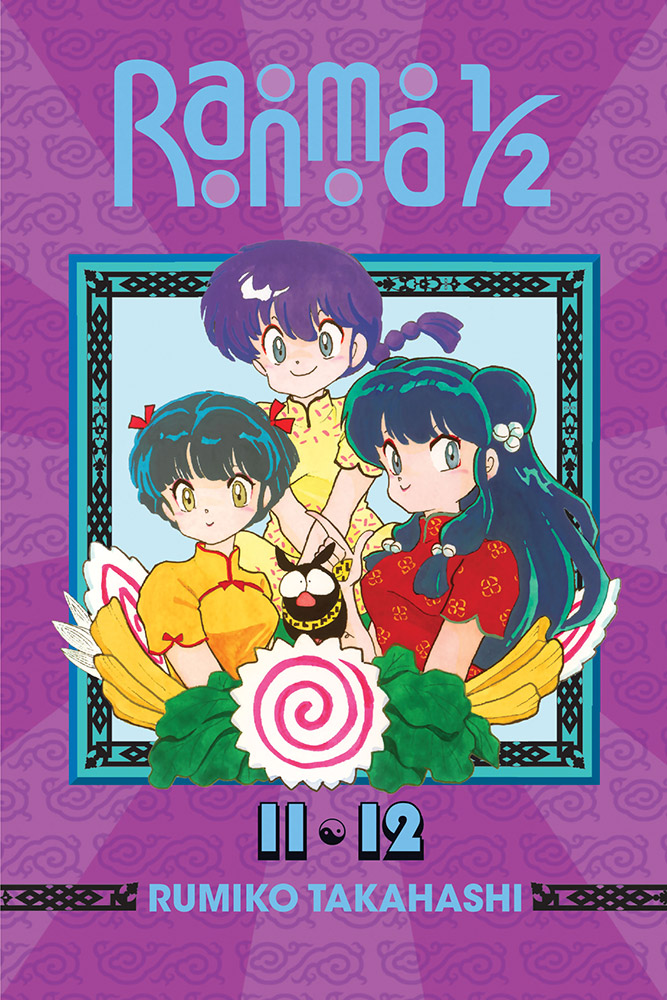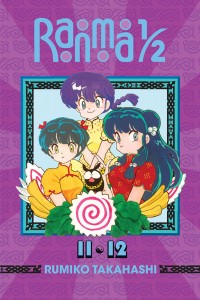By Rumiko Takahashi. Released in Japan by Shogakukan, serialized in the magazine Shonen Sunday. Released in North America by Viz.
My resolve to do full reviews of the whole Ranma series as it comes out can sometimes give me pause, as this is not only a series that fights against a deeper analysis but which actively becomes worse when you treat it too seriously. Treating Ranma as shallow entertainment is something people have to do to get enjoyment out of it, due to the vast cast of unlikeable people in it. And it’s also a lot less serialized than even I remembered it being, with plots and people coming and going as Takahashi saw fit. For example, remember I was talking about Ukyou being such an important major character last time? She’s not even in this. Also, I knew Nabiki didn’t appear much in these early days, but I’d forgotten HOW little.
Ryouga is still a major player here, of course. We get a few plots involving him in this omnibus. The first, where he finally manages to go to his house and invites Akane there (with a jealous Ranma following behind) shows off all of what makes Ryouga who he is: his basic sweetness and shy nature around Akane, his stubborn pigheadedness and anger (which can verge on stupidity), his poor sense of direction (which we discover is a family trait in this story, allowing Ranma to pretend to be his “sister” and get away with it), and his plain old bad luck. In the second story, a soap that Shampoo bought as a Jusenkyo cure is used by Ryouga instead, and his attempts to take advantage of not being cursed anymore show a frightening turn, as he almost becomes a berserk stalker. Best line, after we find the “cure” is temporary like all the other ones, and Akane is reflecting on Ryouga’s unthinking brute strength: “Whoever ends up being Ryouga’s girlfriend will have to be made of sterner stuff than me.” Well, does raising sumo pigs count?
Ranma and Akane appear throughout, of course, and the volume shows off why fans of the couple love them and those who hate them (and by them I mean Akane) can’t stand it. Akane jumps to conclusions all the time (albeit in situations that simply would not happen to normal people), punches Ranma into next week when she’s angry or jealous, and refuses to admit any affection. Ranma, meanwhile, jumps to slightly more reasonable conclusions but makes up for it by having his jealousy be more obvious. And of course he refuses to admit affection even more, even when he thinks Akane is being particularly cute (The end of the “whiskers ramen” story is the first of several that show off Ranma’s handsome face smiling at Akane with genuine affection.) And of course together they make a very effective team. They’re held back by their hot bloodedness and insecurities, but if this weren’t Nerima they’d be dating by now.
There is a new character introduced in this volume, thought he turns out to be related to two old friends. I’d forgotten how long the Principal Returns storyline ran before it was finally revealed that he was Kuno’s father, but it makes sense, given he seems to be just as divorced from reality as his children are. He went to Hawaii to study discipline techniques, and much of his behavior is stereotypical Hawaiian, but the teachers point out that he was always over the top even before this. And on his return, he’s obsessed with giving everyone old-fashioned school haircuts – shaved heads for boys, “pudding bowl” for girls. This leads to a giant melee battle, a frequent appearance in this series, as everyone searches for the coconut that can free them from this fate. (Nice lampshading when a man-eating tiger is set upon the students: “What part of this is Hawaiian?”
Of course, no one should be thinking about whether Kuno and Kodachi’s mental trauma is a result of their father’s upbringing, any more than they should worry about Genma being a horrible father, Akane punching Ranma so hard he flies several blocks, etc. Don’t analyze the series, just laugh along with it. It’s a lot of shallow, shallow fun. That said, join us next time for a plotline that is at least a little more serious, and takes over half the omnibus to resolve.

